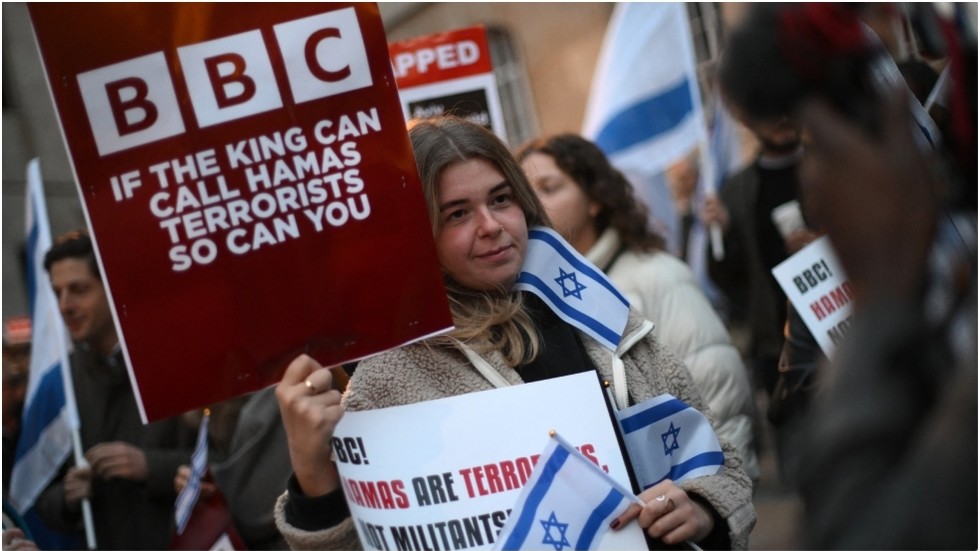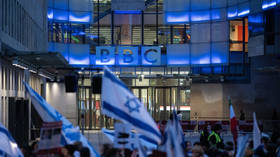
Robert Jenrick argued that the broadcaster was unfair to Israel

Supporters of Israel protest outside the headquarters of the BBC in London, October 16, 2023. © Daniel Leal / AFP
British Immigration Minister Robert Jenrick likened BBC’s coverage of the Hamas-Israel conflict to an anti-Semitic “blood libel” on Wednesday. The public broadcaster came under fire from several UK officials over its reporting on the deadly attack on the Al-Ahli Arab Hospital in Gaza City that took place on October 17, for which Israel and the Palestinian officials blamed each other.
“The reporting of the tragic explosion at the Al-Ahli hospital by the BBC and others was like a 21st century blood libel,” Jenrick wrote on X (formerly Twitter). Historically, blood libels were false accusations that Jews were killing Christian babies for ritual purposes.
In his post, Jenrick was commenting on the question MP Stephen Crabb posed earlier to Prime Minister Rishi Sunak. During a parliamentary debate, Crabb complained that “sections of the British media” had reported the strike on the hospital relying on the information from “officials in terrorist-controlled Gaza.”
“The headlines have since been rewritten, but the outpouring of Jew hate on social media overnight was vile,” Crabb said. He went on to ask that Sunak make a warning that “any information coming from Hamas must be treated with a degree of scrutiny and cross-examination.”

Read more
The PM agreed that “we should not rush to judgment before we have all the facts” about the tragedy.
“It is incumbent on all of those in positions of responsibility in this House and outside in the media to recognize that the words we say will have an impact, and we should be careful with them,” Sunak said, adding that the government was “working with our allies to establish the truth of what has happened.”
British Foreign Secretary James Cleverly echoed this sentiment, arguing that on Tuesday “too many jumped to conclusions around the tragic loss of life at Al-Ahli hospital.” He urged everyone to “wait for the facts, report them clearly and accurately.”
Israel also accused UK media of bias in relation to the hospital blast. IDF spokesman Jonathan Conricus criticized the BBC for “double standards” and argued that a Sky News anchor had opened a recent interview with him with a “very unfair” question that implied that Israel should be held responsible for the deaths in Al-Ahli.
The broadcaster confirmed earlier this week that it was investigating several of its staffers for alleged anti-Israel bias and the support of the Palestinian militant group Hamas.
The BBC has also been criticized by the pro-Palestinian camp. On Monday, the broadcaster apologized for its “misleading description” of demonstrations in support for Palestine in the UK as rallies of Hamas supporters. The group Palestine Action covered the entrance to BBC’s office in London with red paint over the weekend, claiming that the news corporation was spreading Israeli “lies.”
The BBC, meanwhile, insisted that it was upholding the principle of impartiality. “The BBC gets particular attention, partly because we’ve got strong critics in politics and in the press, and partly because we’re rightly held to an especially high standard. But part of keeping to that high standard is to be as objective as it’s possible to be,” John Simpson, the broadcaster’s world affairs editor, said last week.




